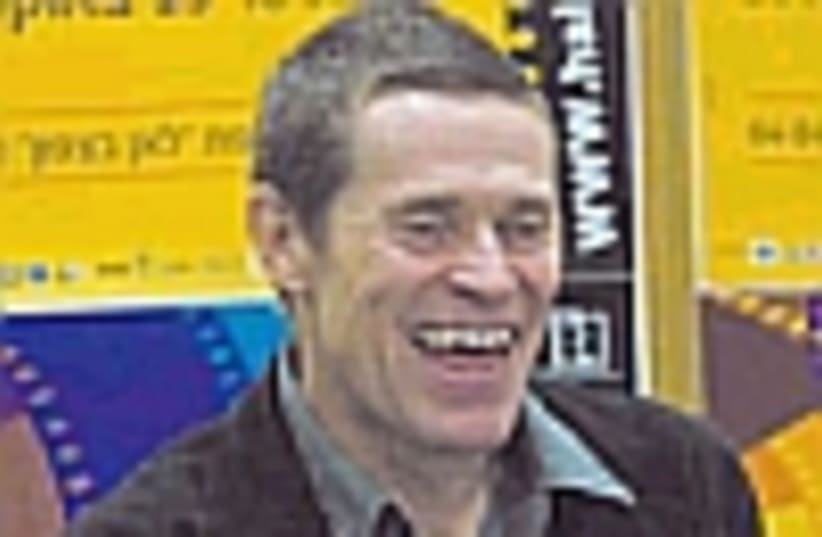Every film festival has one glamor couple, and at this year's Haifa affair (which runs until October 25), it's unquestionably American actor Willem Dafoe and his new bride, Italian director Giada Colagrande.
They are here to promote Before It Had a Name - a movie they've made together, directed by Colagrande. It's about a woman (played by Colagrande) who becomes romantically involved with the caretaker of her late husband's remote upstate New York estate (Dafoe).
Dafoe, 50, co-wrote the film with his wife, whom he met while filming the Wes Anderson movie The Life Aquatic with Steve Zissou in Italy two years ago. The pair, who went everywhere together in Haifa, have clearly had something of a whirlwind romance and, in sharp contrast to many celebrity couples, have chosen to celebrate their relationship by appearing on screen as lovers and by giving joint press conferences and interviews. But they insist the movie is not in any way autobiographical.
"It's not about our personal or private lives," says Colagrande, 30, who has previously directed documentaries and one feature, Open My Heart. "But it is about something that interests us and that we respond to" - the idea of two people suddenly developing feelings for each other, and not knowing exactly how to deal with them.
Although there is no typical Dafoe character, the caretaker in Before It Had A Name is a loner, and if there is one quality that links the characters the actor has played throughout nearly 60 films made over the past 25 years, it's that many are outsiders who live by their wits.
This certainly describes the role Dafoe played in the film he is probably best known for - Caravaggio the thief in Anthony Minghella's The English Patient. Among his other high-profile roles are the commander in Platoon; the tense FBI agent in Mississippi Burning; the menacing stranger in Wild at Heart; Madonna's lover in Body of Evidence; the actor Max Schreck, famous for playing a vampire, in Shadow of the Vampire; and villains in both Spider-Man movies.
"I enjoy playing characters at the margins of society," he says. He paraphrases Israeli director Ram Loevy, who, along with Dafoe and Greek director Theo Angelopoulos, was given an award for artistic achievement at the opening night of the festival and said in his acceptance speech that "the truth belongs to the victims." Dafoe says: "I think the truth belongs to those who are able to tell it," and the outsiders he plays "can reflect the world.... The darkest movies in the world, I often find the most hopeful."
Unlike many actors, Dafoe seems comfortable alternating between big-budget films like the Spider-Man franchise or the xXx movies (he will soon be seen in an xXx sequel) and lower-profile independent movies, as well as between supporting and leading roles. In addition to Before It Had a Name, he has several other movies about to be released, including Spike Lee's Inside Man with Denzel Washington and Clive Owen, and Lars von Trier's Manderlay, the sequel to Dogville.
When asked what he expects from a director, Dafoe says: "A good set-up and a person who's dying to tell a good story. It doesn't even have to be my story; it's my job to make it my story. I don't have a sense of myself as an interpreter, but more as someone who inhabits" a character.
Reflecting on his role as the most famous outsider of all time, Jesus in Martin Scorsese's The Last Temptation of Christ, he says he didn't pay much attention to the controversy surrounding Mel Gibson's The Passion of the Christ, nor did he give Passion star James Caviezel any advice. He admits to feeling flattered, though, when he met actor Max von Sydow, who played Jesus in The Greatest Story Ever Told.
"He said to me, 'Both of us are members of a very exclusive club,'" says Dafoe, recalling it as "one of the sweetest moments" of his career.
Before turning to film, Dafoe, a Wisconsin native, was a stage actor, co-founding the avant-garde Wooster Group in New York with Elizabeth LeCompte, with whom he has a son. Working with The Wooster Group (which made use of video and audio technology in many pieces) "gave me a love of playing with the camera," says Dafoe. For many stage actors, appearing on camera is "a burden," but Dafoe says he has always enjoyed working in movies, and doesn't pine for a return to the stage.
Dafoe and Colagrande, who live in New York but try to spend as much time as they can in Rome, don't have immediate plans to work together again. She is rewriting a script she started before she met Dafoe, while he is considering several projects both large and small (including a third Spider-Man movie). Colagrande plans to stay in the world of lower-budget, intimate filmmaking. "I like to make movies in total freedom," she says, "and the larger the budget, the less freedom you have."
But before they return to the Big Apple, they're planning a brief tour of Israel (it's her first visit here, his third). Dafoe (who is learning Italian so he can speak to Colagrande in her mother tongue) and the multilingual Colagrande were intrigued to learn that Hebrew vowels are not written, and spent several minutes after an interview learning to decipher a Hebrew poster for the Haifa festival. Quickly getting the idea, Colagrande identified the words "international" and "festival," while Dafoe smiled at her, before they headed off for lunch together.
| More about: | Martin Scorsese, Denzel Washington, Lars von Trier, Willem Dafoe |
